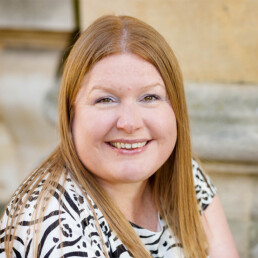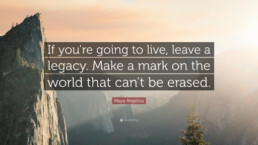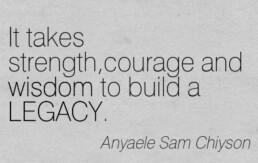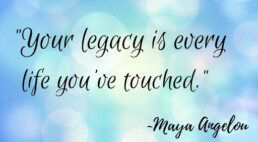
Hannah Wilson
Blog originally published here.

I often reflect on our legacy as teachers, educational leaders but also as human beings. Not that I am morbid, but I do sometimes consider what will be written about me in my obituary and what will be written on my gravestone. It is a good reality check when we get lost in our roles as I will not let it be “she was a hard worker”.
I think it is a great question to ask candidates at interview:
- What would your legacy be if/when you leave your current role/ school?
- What could your legacy be if you joined us and moved on in the future?
I am really proud of the legacy I have created in previous roles where I have set up departments, coached/ mentored staff at all levels of their careers to be the best version of themselves, curated whole school events in schools were the performing arts were not valued, set up federation wide networks and projects like a MAT wide choir. Reading the Ofsted report of the school where I was Vice Principal I can see the work I did to co-lead the school from Inadequate to Outstanding, despite not being there for the inspection. As a headteacher of a start up school everything is our legacy, but we are also conscious that as we move on things will change, but what will remain? Changes in working practice such as flexible working, co-leadership models and part time leadership models I hope will be part of my legacy.

As a founding team of 2 new schools we are conscious that we are constantly sowing seeds for the future. Some days it can be frustrating that we are still nurturing shoots planted last year as it has been a long hard slog and it feels like we should see more growth, but we must remind ourselves we are only 2 terms (8 months) old at the primary and still only 1 year and 2 terms (20 months) old at the secondary. Some days we are trying to run before we can walk.
If you compare our early development as schools to that of a developing child it is a refreshing reality check about our expectations of our team, our community, our students.
An 8 month old’s development:
A whole new world of adventure is beginning to open up for your baby. Many babies start learning to crawl at this age. There will be many bumps and falls as your baby becomes more mobile, but you can help make things safe by child-proofing your home. Your baby may start to become shy of strangers, or cry if you leave him with a babysitter. This is the beginning of separation anxiety. In time he will learn that leaving him doesn’t mean that you won’t come back.
A 20 month old’s development:
Your 20 month old may be able to run, though it’ll take all his concentration, and he’ll probably still be a little unsteady. He may also go upstairs by himself, though he’s likely to need your help on the way down. Chances are, playtime is becoming even more fun as he learns new skills such as kicking and throwing. Toddlers are naturally curious about everything, including their genitals. Just as your toddler played with his fingers and toes when he was younger, he may begin to play with his genitals now. It’s completely natural, and isn’t a cause for concern unless it’s happening constantly.
We have to remember that we will not always witness our legacy whilst we are in post. This can be hard to accept. On our tough days, and there have been many this term, when our values and our resilience are being compromised, we have to pause and remind ourselves that our ripple effect of change is not immediate.
As a values-led school with a holistic approach, we are affecting change, but it is a slow change. The change can feel painfully slow as we take 1 small step forward and 2 large steps back most weeks. We need to hold on to and stay focused on the longer term attitudinal and behavioural change that will be a generational legacy. We need to appreciate that we may not see the fruits of our labour whilst we are at the Aureus Schools. It is our young people as they reach adulthood who will lead the change. Our young people are empassioned global citizens who will be the change.

Our community can be challenging, the issues our children and families face are well-masked behind our new build estates. The wider perception of Oxfordshire is warped compared to the reality. Many of our peers from previous, mainly urban schools, are not aware of the level of trauma we deal with on a daily basis. Everyone assumes it is only in urban environments that certain issues are experienced. As a school we have done a lot of training on mental health, wellbeing and Adverse Childhood Experiences. We have done wider reading on Compassionate Fatigue as the trauma our children have experienced takes it toll on our team in how it manifests itself. Our safeguarding team all have supervision as we are being over exposed to number of cases that could affect our own emotional wellbeing.
Bennie’s blog about tackling racism, does not dwell on the level of prejudice we deal with on a daily basis. The prejudice – racism, sexism, misogyny and homophobia – we tackle day in and day out. The anti-social behaviour in the community which is increasing, will challenge us further as our students become teenagers. Working closely with the local police has been a positive step forwards. We need to break some of the cycles but know that we cannot do it alone – we need a system wide, societal change to sustain it.

With our school system and our society struggling to survive in the complex and fractured landscape we find ourselves in, now more than ever before, we need to focus on the difference we can make. The culture and ethos at both of our schools is based on our shared vision and values, underpinned by relationships.
Our legacy might not be tangible, nor visible, yet, but we know we are making a difference and creating a different kind of legacy. A legacy that we will not see with our own eyes perhaps.

Wisdom from Legacy, James Kerr:
Mā te rongo, ka mohiō;
Mā te mohiō, ka mārama;
Mā te mārama, ka mātau;
Mā te mātau, ka ora.
From listening comes knowledge;
From knowledge comes understanding;
From understanding comes wisdom;
From wisdom comes well-being.
